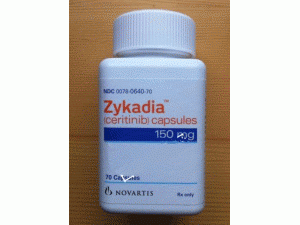色瑞替尼胶囊ceritinib (Zykadia 150mg Capsules)
 产地国家:美国
产地国家:美国
处方药:是
所属类别: 150毫克/胶囊 70胶囊/瓶
包装规格: 150毫克/胶囊 70胶囊/瓶
计价单位:瓶
生产厂家英文名:Novartis
原产地英文商品名:Zykadia 150mg/cap 70Caps/bottle
原产地英文药品名:ceritinib/LDK378
中文参考商品译名:Zykadia胶囊 150毫克/胶囊 70胶囊/瓶
中文参考药品译名:色瑞替尼
简介
新型靶向抗癌药Zykadia(ceritinib,中文药名:色瑞替尼胶囊)-为新一代治疗小细胞肺癌口服药。近日,抗癌药新型靶向抗癌药Zykadia(ceritinib/LDK378 色瑞替尼)胶囊获FDA批准,用于经Xalkori(crizotinib克唑替尼)治疗后病情恶化或对Xalkori不耐受的间变性淋巴瘤激酶阳性(ALK+)转移性非小细胞肺癌(NSCLC)患者的治疗。Zykadia是一种口服、选择性间变性淋巴瘤激酶(ALK)抑制剂。在肺癌的临床治疗中,ALK是一个重要的治疗靶标。ALK基因能够与其他基因融合,表达一种异常的融合蛋白,促进癌细胞的形成和生长。FDA于2013年3月授予Zykadia突破性疗法认定。批准日期:2014年5月5日 公司:诺华制药ZYKADIA(ceritinib)胶囊,用于口服ZYKADIA(ceritinib)片剂,用于口服美国最初批准:2014年
作用机制:Ceritinib是一种激酶抑制剂。在临床相关浓度的生物化学或细胞测定中鉴定的ceritinib抑制的靶标包括ALK,胰岛素样生长因子1受体(IGF-1R),胰岛素受体(InsR)和ROS1。其中,ceritinib对ALK的活性最高。 在体外和体内测定中,Ceritinib抑制ALK的自身磷酸化,ALK介导的下游信号蛋白STAT3的磷酸化和ALK依赖性癌细胞的增殖。Ceritinib抑制表达EML4-ALK和NPM-ALK融合蛋白的细胞系的体外增殖,并证明了小鼠和大鼠中EML4-ALK阳性NSCLC异种移植物生长的剂量依赖性抑制。Ceritinib在携带EML4-ALK阳性NSCLC异种移植物的小鼠中表现出剂量依赖性抗肿瘤活性,其在临床相关范围内的浓度下显示出对克唑替尼的抗性。
适应症和用法:ZYKADIA是一种激酶抑制剂,适用于治疗患有转移性非小细胞肺癌(NSCLC)的成人,其肿瘤为间变性淋巴瘤激酶(ALK)阳性,如FDA批准的检测所检测。
剂量和给药
建议剂量:每日口服450毫克,同时食用。
剂量形式和强度:胶囊:150mg;片剂:150mg
禁忌症:没有
警告和注意事项:
1.胃肠道不良反应:ZYKADIA可引起胃肠道不良反应。如果严重或无法忍受,如果对止吐药或止泻药没有反应,则扣留;经过改进,以减少的剂量恢复ZYKADIA。
2.肝毒性:ZYKADIA可引起肝毒性。至少每月监测肝脏实验室检查。扣留然后剂量减少,或永久停止ZYKADIA。
3.间质性肺病/肺炎:2.4%的患者发生。在诊断为治疗相关的ILD/肺炎的患者中永久停用ZYKADIA。
4.QT间期延长:ZYKADIA可导致QTc间期延长。监测患有充血性心力衰竭,缓慢性心律失常,电解质异常或正在服用已知可延长QTc间期的药物的患者的心电图和电解质。扣留然后剂量减少,或永久停止ZYKADIA。
5.高血糖症:ZYKADIA可引起高血糖症。在治疗前监测空腹血糖,之后定期监测。如所示启动或优化抗高血糖药物。扣留然后剂量减少,或永久停止ZYKADIA。
6.心动过缓:ZYKADIA可引起心动过缓。定期监测心率和血压。扣留然后剂量减少,或永久停止ZYKADIA。
7.胰腺炎:可发生脂肪酶和/或淀粉酶和胰腺炎的升高。在治疗前监测脂肪酶和淀粉酶,并在临床指示后定期监测。扣留然后剂量减少ZYKADIA。
8.胚胎-胎儿毒性:ZYKADIA会导致胎儿伤害。告知女性有可能对胎儿造成潜在风险的生殖潜力并使用有效的避孕措施。
不良反应:接受ZYKADIA 450 mg食物治疗的患者最常见的不良反应(发生率≥25%)是腹泻,恶心,腹痛,呕吐和疲劳,在禁食条件下使用ZYKADIA 750 mg是腹泻,恶心,呕吐,疲劳,腹痛,食欲减退和体重减轻。
药物相互作用:1.CYP3A抑制剂和诱导剂:避免与强效CYP3A抑制剂或诱导剂同时使用ZYKADIA。如果同时使用强CYP3A抑制剂是不可避免的,剂量会减少ZYKADIA。2.CYP3A底物:避免ZYKADIA与敏感的CYP3A底物共同给药。3.CYP2C9底物:避免ZYKADIA与CYP2C9底物共同给药,其中浓度变化最小可能导致严重的毒性。
用于特定人群:1.哺乳期:建议不要母乳喂养。2.严重肝功能损害:对于严重肝功能不全患者(Child-Pugh C),剂量减少ZYKADIA。
储存:在20°C至25°C(68°F至77°F); 允许的偏差在15°C至30°C(59°F至86°F)之间[见USP受控室温]。
英文版说明书
ZYKADIA(ceritinib)capsules, for oral useINDICATIONZYKADIA® (ceritinib) capsules is indicated for the treatment of patients with metastatic non-small cell lung cancer (NSCLC) whose tumors are anaplastic lymphoma kinase (ALK)-positive as detected by an FDA-approved test.IMPORTANT SAFETY INFORMATION for ZYKADIA® (ceritinib) capsulesGastrointestinal Adverse ReactionsSevere gastrointestinal toxicity occurred in patients treated with ZYKADIA 750 mg under fasted conditions. Diarrhea, nausea, vomiting, or abdominal pain occurred in 95% of 925 patients, including severe cases in 14% of patients treated with ZYKADIA across clinical studiesIn a dose optimization study, the incidence and severity of gastrointestinal adverse reactions were reduced for patients treated with ZYKADIA 450 mg with food. Diarrhea, nausea, vomiting, or abdominal pain occurred in 76% of 89 patients treated with ZYKADIA at the recommended dose of 450 mg with food. Of these, the majority experienced grade 1 events (51%). One patient experienced grade 3 diarrhea. No patients had diarrhea, nausea, vomiting, or abdominal pain that required dose reduction; 8% of patients had diarrhea or nausea that required at least 1 dose interruptionMonitor and manage patients using standards of care, including antidiarrheals, antiemetics, or fluid replacement, as indicated. Based on the severity of the adverse drug reaction, withhold ZYKADIA with resumption at a reduced doseHepatotoxicityDrug-induced hepatotoxicity occurred in patients treated with ZYKADIA. Elevations in alanine aminotransferase (ALT) greater than 5 times the upper limit of normal (ULN) occurred in 28% and elevations in aspartate aminotransferase (AST) greater than 5 times the ULN occurred in 16% of 925 patients treated with ZYKADIA 750 mg under fasted conditions across clinical studies. Concurrent elevations in ALT greater than 3 times the ULN and total bilirubin greater than 2 times the ULN occurred in 0.3% of patients across clinical studies. Approximately 1.0% of patients required permanent discontinuation due to hepatotoxicity. In a dose optimization study, there were no clinically meaningful differences observed in the incidence of hepatotoxicity between the 750-mg under fasted conditions arm and the 450-mg with food arm.Monitor with liver laboratory tests including ALT, AST, and total bilirubin once a month and as clinically indicated, with more frequent testing in patients who develop transaminase elevations. Based on the severity of the adverse drug reaction, withhold ZYKADIA with resumption at a reduced dose or permanently discontinue ZYKADIAInterstitial Lung Disease/PneumonitisSevere, life-threatening, or fatal interstitial lung disease (ILD)/pneumonitis can occur in patients treated with ZYKADIA. Across clinical studies, ILD/pneumonitis was reported in 2.4% of 925 patients treated with ZYKADIA 750 mg under fasted conditions. Common Terminology Criteria for Adverse Events (CTCAE) grade 3 or 4 ILD/pneumonitis was reported in 1.3% of patients with fatal events reported in 0.2% of patients. Ten patients (1.1%) discontinued ZYKADIA across clinical studies due to ILD/pneumonitis. In a dose optimization study, there were no clinically meaningful differences observed in the incidence of ILD/pneumonitis between the 750-mg under fasted conditions arm and the 450-mg with food armMonitor patients for pulmonary symptoms indicative of ILD/pneumonitis. Exclude other potential causes and permanently discontinue ZYKADIA in patients diagnosed with treatment-related ILD/pneumonitisQTc Interval ProlongationQTc interval prolongation, which may lead to an increased risk for ventricular tachyarrhythmias (eg, torsades de pointes) or sudden death, occurred in patients treated with ZYKADIA in clinical studies. Across clinical studies, 6% of 919 patients with at least 1 postbaseline electrocardiogram (ECG) assessment experienced a QTc interval increase over baseline of greater than 60 milliseconds (ms). Approximately 1.3% of patients taking ZYKADIA 750 mg fasted were found to have a QTc greater than 500 ms. A pharmacokinetic/pharmacodynamic analysis suggested that ZYKADIA causes concentration-dependent increases in the QTc interval. Across clinical studies, 0.2% of patients discontinued ZYKADIA due to QTc interval prolongation. In a dose optimization study, there were no clinically meaningful differences observed in the incidence of QTc interval prolongation between the 750-mg under fasted conditions arm and the 450-mg with food armWhen possible, avoid use of ZYKADIA in patients with congenital long QT syndrome. Conduct periodic monitoring with ECGs and electrolytes in patients with congestive heart failure, bradyarrhythmias, electrolyte abnormalities, or those who are taking medications that are known to prolong the QTc interval. Withhold ZYKADIA in patients who develop a QTc interval greater than 500 ms on at least 2 separate ECGs until the QTc interval is less than 481 ms or recovery to baseline if the QTc interval is greater than or equal to 481 ms, then resume ZYKADIA at a reduced dose. Permanently discontinue ZYKADIA in patients who develop QTc interval prolongation in combination with torsades de pointes or polymorphic ventricular tachycardia or signs/symptoms of serious arrhythmiaHyperglycemiaHyperglycemia can occur in patients receiving ZYKADIA. Across clinical studies, CTCAE grade 3 or 4 hyperglycemia, based on laboratory values, occurred in 13% of 925 patients treated with ZYKADIA 750 mg under fasted conditions. In a dose optimization study, there were no clinically meaningful differences observed in the incidence of hyperglycemia between the 750-mg under fasted conditions arm and the 450-mg with food armMonitor fasting serum glucose prior to the start of ZYKADIA treatment and periodically thereafter as clinically indicated. Initiate or optimize antihyperglycemic medications as indicated. Based on the severity of the adverse drug reaction, withhold ZYKADIA until hyperglycemia is adequately controlled, then resume ZYKADIA at a reduced dose. If adequate hyperglycemic control cannot be achieved with optimal medical management, permanently discontinue ZYKADIABradycardiaBradycardia occurred in patients receiving ZYKADIA. Across clinical studies, sinus bradycardia, defined as a heart rate of less than 50 beats per minute (bpm), was noted as a new finding in 1% of 925 patients treated with ZYKADIA 750 mg under fasted conditions. Bradycardia was reported as an adverse drug reaction in 1% of patients. No patient required discontinuation and 0.1% required interruption with subsequent dose reduction for bradycardia. In a dose optimization study, there were no clinically meaningful differences observed in the incidence of bradycardia between the 750-mg under fasted conditions arm and the 450-mg with food armAvoid using ZYKADIA in combination with other agents known to cause bradycardia (eg, beta blockers, nondihydropyridine calcium channel blockers, clonidine, and digoxin) to the extent possible. Monitor heart rate and blood pressure regularly. In cases of symptomatic bradycardia that is not life-threatening, withhold ZYKADIA until recovery to asymptomatic bradycardia or to a heart rate of 60 bpm or higher, eva luate the use of concomitant medications, and adjust the dose of ZYKADIA. Permanently discontinue ZYKADIA for life-threatening bradycardia if no contributing concomitant medication is identified; however, if associated with a concomitant medication known to cause bradycardia or hypotension, withhold ZYKADIA until recovery to asymptomatic bradycardia or to a heart rate of 60 bpm or higher, and if the concomitant medication can be adjusted or discontinued, resume ZYKADIA at a reduced dosePancreatitisPancreatitis occurred in patients receiving ZYKADIA. Pancreatitis, including 1 fatality, has been reported in less than 1% of patients receiving ZYKADIA 750 mg under fasted conditions in clinical studies. CTCAE grade 3 or 4 elevations of amylase occurred in 7% of patients receiving ZYKADIA 750 mg under fasted conditions across clinical studies, whereas CTCAE grade 3 or 4 elevations of lipase occurred in 14% of patients. In a dose optimization study, there were no clinically meaningful differences observed in the incidence of pancreatitis between the 750-mg under fasted conditions arm and the 450-mg with food ArmMonitor lipase and amylase prior to the start of ZYKADIA treatment and periodically thereafter as clinically indicated. Based on the severity of the laboratory abnormalities, withhold ZYKADIA with resumption at a reduced doseEmbryo-fetal ToxicityBased on its mechanism of action and findings in animal studies, ZYKADIA can cause fetal harm when administered to a pregnant woman. In animal studies, administration of ceritinib to rats and rabbits during organogenesis at maternal plasma exposures the recommended human dose caused increases in skeletal anomalies in rats and rabbitsAdvise pregnant women of the potential risk to a fetus. Advise women of reproductive potential to use effective contraception during treatment with ZYKADIA and for 6 months following completion of therapy. Based on the potential for genotoxicity, advise men with female partners of reproductive potential to use condoms during treatment with ZYKADIA and for 3 months following completion of therapyLactationNo data exist regarding the presence of ceritinib or its metabolites in human milk, the effects of ceritinib on the breastfed infant, or its effects on milk production. Because of the potential for serious adverse reactions, including gastrointestinal toxicity, hepatotoxicity, pneumonitis, bradycardia, and pancreatitis, advise women not to breastfeed during treatment with ZYKADIA and for 2 weeks following completion of therapyAdverse ReactionsThe most common adverse reactions in ASCEND-4, which eva luated patients treated with 750 mg under fasted conditions, (incidence ≥25% all grades) were increased ALT/AST (91%/86%), diarrhea (85%), increased gamma-glutamyl transferase (GGT) (84%), increased alkaline phosphatase (81%), increased creatinine (77%), nausea (69%), vomiting (67%), anemia (67%), hyperglycemia (53%), fatigue (45%), abdominal pain (40%), decreased phosphate (38%), increased amylase (37%), decreased appetite (34%), and neutropenia (27%)In ASCEND-4, which eva luated patients treated with 750 mg under fasted conditions, grade 3 or 4 adverse reactions (incidence ≥2%) were increased GGT (49%), ALT/AST (34%/21%), increased alkaline phosphatase (12%), hyperglycemia (10%), increased amylase (8%), fatigue (7%), increased lipase (6%), diarrhea (5%), vomiting (5%), weight loss (4%), abdominal pain (4%), anemia (4%), increased creatinine (4%), decreased phosphate (4%), nausea (3%), prolonged QT interval (3%), neutropenia (2%), and pericarditis (2%)In ASCEND-4, which eva luated patients treated with 750 mg under fasted conditions, serious adverse drug reactions reported in at least 2% or more of patients treated with ZYKADIA were pneumonia, pleural effusion, vomiting, nausea, dyspnea, hyperglycemia, increased AST, lung infection, and pericardial effusion. Adverse reactions that led to death occurred in 4 patients treated with ZYKADIA, consisting of 1 each: myocardial infarction, respiratory tract infection, pneumonitis, and unknown causeThe most common adverse reactions in ASCEND-1, which eva luated patients treated with 750 mg under fasted conditions, (incidence ≥25% all grades) were diarrhea (86%), nausea (80%), increased ALT/AST (80%/75%), vomiting (60%), abdominal pain (54%), fatigue (52%), decreased appetite (34%), and constipation (29%)In ASCEND-1, which eva luated patients treated with 750 mg under fasted conditions, grade 3/4 adverse reactions (incidence ≥2%) were increased ALT/AST (27%/13%), diarrhea (6%), fatigue (5%), nausea (4%), vomiting (4%), ILD/pneumonitis (3%), and abdominal pain (2%)Serious adverse drug reactions reported in ASCEND-1, which eva luated patients treated with 750 mg under fasted conditions, (incidence >2%) were convulsion, pneumonia, ILD/pneumonitis, dyspnea, dehydration, hyperglycemia, and nausea. Fatal adverse reactions occurred in 5% of patients, consisting of: pneumonia (4 patients), respiratory failure, ILD/pneumonitis, pneumothorax, gastric hemorrhage, general physical health deterioration, pulmonary tuberculosis, cardiac tamponade, and sepsis (1 patient each)In ASCEND-8, a dose optimization study of ZYKADIA 450 mg daily with food was compared with 750 mg daily under fasted conditions. The overall safety profile of ZYKADIA 450 mg with food was consistent with ZYKADIA 750 mg fasted, except for a reduction in gastrointestinal adverse reactions, while achieving comparable steady-state exposure. The incidence and severity of gastrointestinal adverse reactions (diarrhea 56%, nausea 45%, vomiting 35%) were reduced for patients treated with ZYKADIA 450 mg with food; the only grade ≥3 adverse reaction was grade 3 diarrhea in 1 patient (1.1%)Drug InteractionsEffect of Other Drugs on CeritinibCYP3A inhibitors increase ceritinib plasma concentrations: Avoid concurrent use of ZYKADIA with strong CYP3A inhibitors. If concomitant use of strong CYP3A inhibitors is unavoidable, reduce the ZYKADIA dose by approximately one-third, rounded to the nearest multiple of the 150-mg dosage strength. After discontinuation of a strong CYP3A inhibitor, resume the ZYKADIA dose that was taken prior to initiating the strong CYP3A4 inhibitorCYP3A inducers decrease ceritinib plasma concentrations: Avoid concurrent use of ZYKADIA with strong CYP3A inducersEffect of Ceritinib on Other DrugsCeritinib may inhibit CYP3A and CYP2C9 at clinical concentrations. Avoid concurrent use of CYP3A and CYP2C9 substrates known to have narrow therapeutic indices or substrates primarily metabolized by CYP3A and CYP2C9 during treatment with ZYKADIAIf use of these medications is unavoidable, consider dose reduction of CYP3A substrates with narrow therapeutic indices and CYP2C9 substrates with narrow therapeutic indicesDrug-Food/Drink InteractionsDo not consume grapefruit and grapefruit juice as they may inhibit CYP3A in the gut wall and increase the bioavailability of ceritinib。
药品价格查询,专业药品查询网站,药品说明书查询,药品比价 » 色瑞替尼胶囊ceritinib (Zykadia 150mg Capsules)





